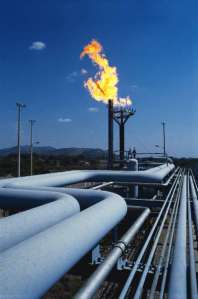
Photodisc
There are many questions surrounding the practice of shale gas drilling—and especially the hydraulic fracturing methods used to get the gas. But it really all boils down to one issue: trust. Do Americans trust gas companies to drill in a responsible way and minimize the risk of any accidents or contamination? And perhaps more importantly, do Americans trust the government—state and federal—to responsibly regulate shale gas companies, and even stop drilling if it turns out that the environmental cost exceeds the potential benefits?
When I spent time in northeastern Pennsylvania in March for our cover story on shale gas, it became clear very quickly to me that trust was lacking in the towns most affected by fracking. People who had wells drilled on their property—especially those who later had problems—didn’t trust the gas companies to be honest about the potential risks, and they didn’t trust the state and local government officials to be on their side. The industry itself was of little help. Drillers generally refused to reveal theingredients in their fracking fluids—which only stokes public concerns—and their idea of communication seemed to consist of propagandistic TV commercials and relentless pro-industry websites. But they weren’t alone—some in the environmental community were willing to push the facts and take their own criticisms of shale gas drilling much too far.
More from TIME: Could Shale Gas Power the World?
What’s needed on shale gas is an honest broker, an institution that the public can trust. That should be the federal government—and after years of doing little to regulate shale gas drilling, Washington could step in just in time. That’s my takeaway from a valuable report on shale gas drilling issued this morning by an independent panel for the Department of Energy. (Download a PDF of the report here.) The panel—which is led by MIT professor and former Central Intelligence Agency director John Deutsch, and which includes environmentalists and industry representatives—covers both the fracking process itself, as well as the larger concerns surrounding drilling and gas development. And while the report largely endorses shale gas for its economic and potential environmental benefits, it calls for significantly more oversight than currently exists.
Video from TIME: The Fuss Over Fracking
From the executive summary:
The Subcommittee stresses the importance of a process of continuous improvement in the various aspects of shale gas production that relies on best practices and is tied to measurement and disclosure. While many companies are following such a process, much-broader and more extensive adoption is warranted. The approach benefits all parties in shale gas production: regulators will have more complete and accurate information; industry will achieve more efficient operations; and the public will see continuous, measurable improvement in shale gas activities.
Specifically, the panel calls for significantly improving public access to information about shale gas drilling—including the identity of chemicals used in the fracking process, something environmentalists and activists have demanded for years. The panel would also largely ban the use of diesel fuel in shale gas production, and would track both air pollution from drilling and disposal of waste water from fracking. (Each well can use as much as 5 million gallons of water, though much of it stays below the ground, and drilling companies are working on recycling waste water rather than disposing of it.) And the report suggests a comprehensive accounting of all the greenhouse gases generated during shale gas drilling—a point of much contention recently. (A study earlier this year from Cornell suggested that shale gas might have a carbon footprint largely than coal, though many critics believe that the its conclusions were flawed.)
More from TIME: Fracking and Cell Phones: Evaluating the Real Risks
Some of the more strident voices from both industry and the environmental community were unhappy with the panel’s conclusions and its composition—either too many industry representatives, or not enough. But for those in the middle—the members of the public whose trust needs to be regained—I think the report’s recommendations could go a long way, though there’s a big difference between making recommendations and seeing them carried out. Still, I think Michael Levi of the Council on Foreign Relations has it right:
If sensible people on all sides look past the fact that they don’t like everything in the report, they might even find the beginnings of a blueprint for compromise.
Before we can have a compromise, we need trust—and the Energy Department panel offers hope that there are people in Washington on shale gas we actually can trust.
More from Ecocentric: Is New York About to Get Fracking? Not Exactly
Bryan Walsh is a senior writer at TIME. Find him on Twitter at @bryanrwalsh. You can also continue the discussion on TIME’s Facebook page and on Twitter at @TIME


